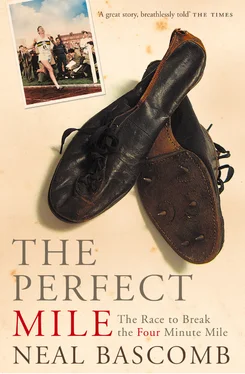By Tuesday, 22 July, the day of his qualifying round, Santee had learned little about his race and he desperately wished Bill Easton was there with him. Santee discovered that he could not warm up on the track before the race, which was part of his normal routine, so he jogged around outside the stadium before returning to the locker-room to be called out for his heat. All around him athletes were speaking in unrecognisable languages, and he had no idea who among them he was competing against or what times they usually ran. His biggest fear was falling too far behind the leaders. There was no one to speak to about strategy. And he could not help thinking that he should not even have been in this race. The 1,500m was his best distance; he certainly had much more experience running it. Seldom did a runner, even one as naturally talented as Wes Santee, have the speed and stamina to compete at a world-class level in the 1,500m and the 5,000m. With each minute that passed, his apprehension grew.
When he saw Fred Wilt, the Indiana University alumnus who had competed extensively overseas, Santee hurried across the locker-room to speak to him. Wilt would know what Santee should do.
‘I really don’t know much,’ Wilt said after Santee had told him the names of those in the heat against him. ‘Except that Schade guy. He’ll probably run a steady, even race. Follow him.’
And with this information, Santee was called to the track for his heat by an Olympic official. He jogged into the stadium, feeling only slightly comforted by this one piece of advice. With Easton, he would have gone over the race on the blackboard in his office at KU, his coach indicating lap times to shoot for, how the other runners traditionally ran, and when to move with the pack or ahead of it. His race was literally drawn out for him in chalk. Only when Santee approached the starting line did he notice the German ace Herbert Schade. Except for the Canadian runner Ferguson, the rest of the field was a mystery. What if the German started out too fast or too slow? What was the best time he was capable of running? There were tens of questions he needed answered and only seconds before the race started. By the time the athletes were called to their marks, Santee felt overwhelmed. This was the Olympics. He was representing his country, and, perhaps more importantly, Kansas. He had to do well, yet he felt displaced, as if he had been blindfolded, led out into a dark field, and left alone to find his way out.
Soon enough the starting gun fired, and Santee was running. Into the first turn, he was in a good position behind Schade, right where he wanted to be. The first lap went well; Schade led, Santee kept back by several runners, but stayed close enough. By the third lap, Santee and the German were alone. The others had fallen back on the pace. Halfway through the race, Santee sensed his legs tiring, but he held on to second position. At the 3,000-metre mark he heard Schade’s time called – 8:23 – and then his own, two seconds slower. It was too fast. The best he had run this distance was 8:44, and he was 150 yards ahead of that pace. Santee began to lose confidence. He couldn’t maintain this kind of speed. What he should have known before this point in the race was that the German was using this heat to show how fast he was to Czechoslovakia’s Zatopek and France’s Mimoun, both of whom were in separate heats and would likely prove his stiffest competition in the final. An Olympic record would be broken if Schade continued at this pace, and he meant to continue.
Half a lap later, Santee lost momentum. His arms and legs leadened; his chest couldn’t bring in enough breath. His pace slackened. By 4,000 metres he hardly felt like he was moving, the sensation more like running through water than over a track. Everything seemed to be happening in slow motion. He couldn’t drive his legs. Runner after runner passed him and there was nothing he could do, even had he been suddenly infused with all the will power in the world. His body had given out. He finished at a dismally slow pace, thirteenth overall, in a time of 15:10.4 – the worst showing at this distance of his career.
As he put on his sweatsuit, Santee was exhausted physically, but the fear and dread before the race had taken an even greater toll. Emotionally he was a wasteland. He didn’t want to speak to anybody. He was embarrassed when he left the stadium, wanting to hole up in his room until they flew out of Helsinki. As he later said, ‘Not only did I lose, I wasn’t even in the race.’ For an athlete who had seldom known defeat, particularly on this scale, this was agony. It was like the loss of a first love. His heart literally ached.
Sitting in the stands at the Olympic Stadium on 24 July, Landy did not like his chances in the 1,500m set to take place in less than hour. He was in the fourth, and probably most difficult, heat in the qualifying round. Only the top four finishers in his race moved forward to the semi-final, and his eight-man heat included French and Yugoslav champions El Mabrouk and Otenhajmer, as well as America’s Bob McMillen and England’s Roger Bannister, the latter of whom Landy had met briefly while competing in London. Landy knew that his best time in the distance (3:52.8) was several seconds slower than his competitors, plus he was much more accustomed to running a mile than 1,500m.
Although only 120 yards shorter than the mile, the 1,500m was an awkward race. Standard European tracks, Helsinki included, were 400 metres in length, meaning that runners competed over three and three-quarter laps. Landy disliked the race, as he later explained: ‘There’s nothing graceful about it. You don’t start where you finish, it’s ugly.’ The split times were difficult to understand, and given the incomplete first lap, he found it hard to get into his rhythm.
At that moment, however, Landy was more interested in watching the 5,000m final, which was about to start. He had failed to qualify for the longer event, finishing over thirty seconds behind the winner of his heat, Alain Mimoun, in tenth position overall. It was a poor showing, but his personal best, achieved in early February, had been only two seconds faster. He had to settle for watching his friend and countryman Les Perry try to take home a medal in an event featuring the ‘human locomotive’ Emil Zatopek, former gold medal winner Gaston Reiff, new Olympic record holder Herbert Schade, and English up-and-comer Chris Chataway, as well as the fearsome French-Algerian Mimoun. It promised to be a must-see battle.
When the gun went off, the red-headed Chataway moved into an early lead, at the head of the pack for the first lap, with Schade behind him and Perry in the middle of the pack. The Australian team cheered on the ‘Mighty Atom’, but by the end of the third lap, with the first four runners averaging sixty-seven seconds per lap, Perry looked like a minor player on a great stage. Soon enough, Zatopek was setting the pace. The very sight of the 30-year-old Czech army major was frightening. His bony five-foot-eight-inch frame sped down the track in an unrhythmic mess of arms and legs. His head rolled back and forth as he ran; his tongue protruded from his mouth; his face contorted as if, one sportswriter noted, he was experiencing an ‘apoplectic fit’. Yet the runners knew he was fitter than they were, and Zatopek did not hesitate to inform them of the matter, mid-race. While his competitors gasped for air, the Czech considered it a good time for a conversation. During his 10,000m final, in which he’d broken his own world record, Zatopek had run alongside the Russian Anoufriev, who had set a rapid early pace, and admonished him on the dangers of going out too fast. As Zatopek blazed into the lead in the 5,000m final, he yelled back at Schade in German, ‘Herbert, do two laps with me!’
Читать дальше












